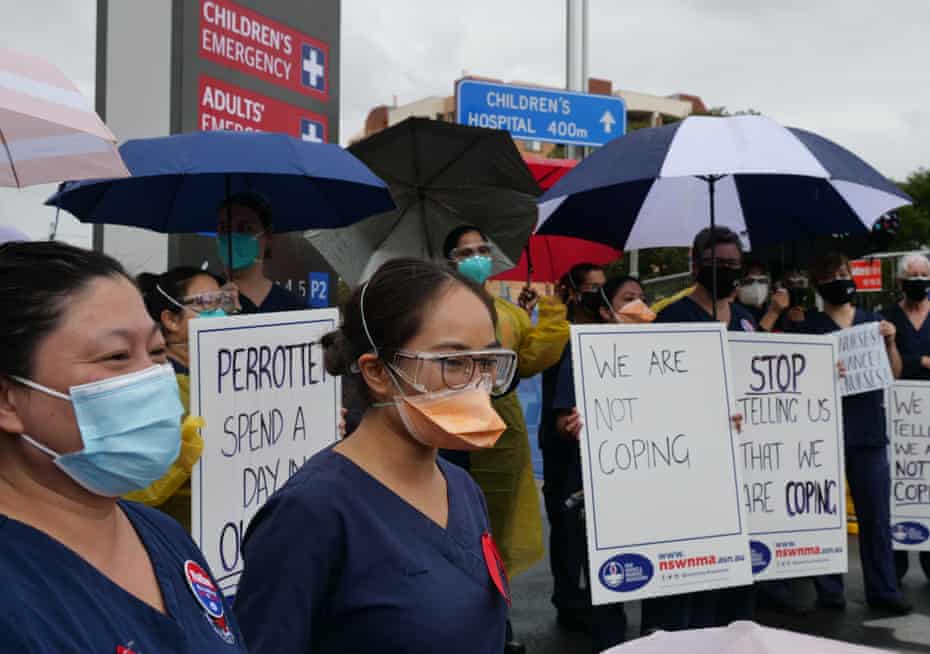CW: This article mentions trauma and unsanitary conditions.
Nurses and midwives across NSW took strike action on Tuesday. The strikes, organised by the NSW Nurses and Midwives Association, were the largest of their kind since 2013 despite orders from the Industrial Relations Commission to call off the action.
Key workers continued to work to care for critically unwell patients and preserve life.
The intense pressure placed on healthcare workers as a result of the government’s handling of the COVID-19 pandemic was a key cause for the action. The Association is demanding better nurse to patient staffing ratios similar to those in Victoria and Queensland. Other key demands involved securing pay rises above the state’s arbitrary cap of 2.5% per year and that the Perottet Government abandon proposed changes to workers’ compensation legislation.
On Monday, NSW Treasurer Matt Kean described these demands as “very reasonable” to ABC radio.
Nurses and midwives, drawing from the Central Coast, Wollongong, Shellharbour and even the Blue Mountains, congregated at Sydney CBD and marched down Macquarie Street towards Parliament House. Smaller rallies took place across the state.
The Welcome to Country was delivered by Nathan Moran, leader of the Metropolitan Aboriginal Land Council. Moran thanked nurses and midwives for “taking care of our children and looking after our Elders”. He recognised in particular First Nations healthcare workers, who were met with warm applause.
President of the Nurses and Midwives Association, O’Bray Smith, led the rally and criticised the government’s handling of the pandemic as being “mismanaged from the top down”. Premier Dominic Perrottet’s “let it rip” approach during the recent Omicron wave was described as causing senseless death from COVID and consequent staff shortages. A minute’s silence was held in recognition of the significant trauma nurses have suffered over the past two years, being part of Smith’s wishes for the rally to be a therapeutic event for attendees.
Later in the rally, Tim Blofield, nurse and Secretary of the Westmead Branch decried the condition of the healthcare system even before the pandemic.
“They want us to return to normal,” he said. “The problem was that normal was horrible”.
The statewide strike was preceded by crisis talks between the government and the union. Smith, who attended the talks, described these as being “merely a tickbox”. She said that nurses were offered nothing of substance during the negotiations. Instead, Health Minister Brad Hazzard was described as misunderstanding the current midwifery staffing model. As a result, Smith lamented being mansplained to during the talks and in a nod to Julia Gillard claimed that she and union members “would not be lectured about safe staffing by these men, not now, not ever”.
Brett Holmes, General Secretary of the Association, labelled Dominic Perrotet as an “economic vandal”. Highlighting the economic values of implementing the strikers’ demands, Holmes said that ratios save lives. In doing so, Holmes said, ratios save money, given the significant cost of treatment for poor health and deaths. The pay rise offered to all public sector workers last year, just 0.3%, was described as “sweet-bugger all” that crushed private sector wages in the process.
Assistant General Secretary, Shaye Cavendish, read stories sent by the community. These included a nurse forced to leave a COVID patient to die alone to be called elsewhere, an expectant mother made to wait seven hours for a birthing suite and elderly rural patients being made to wait for care in their own faeces and urine.
Towards the end of the rally, Skye Romer, the Secretary of the Royal Prince of Wales Mental Health Branch, asserted that it was the professional obligation of nurses to strike. She said that the nurses’ registration standards, code of conduct and code of ethics required nurses to advocate for equitable health policies so that they can provide safe and competent care.
The rally was marked by frustration with the government’s inability to back up rhetoric with tangible improvements to workers’ lives. Romer ordered an end to “the platitudes” and “gaslighting” of the government. Blofield said “I don’t care about your thanks. I can’t pay my rent or my mortgage with your thanks”.
The strike comes in a period in which a variety of public sector workers have engaged in industrial action, including teachers and transport workers. Some of those were in attendance. Unifying these actions are a government hiding behind its restrictive 2.5% wage cap and an Industrial Relations Commission that is hostile to workers.





